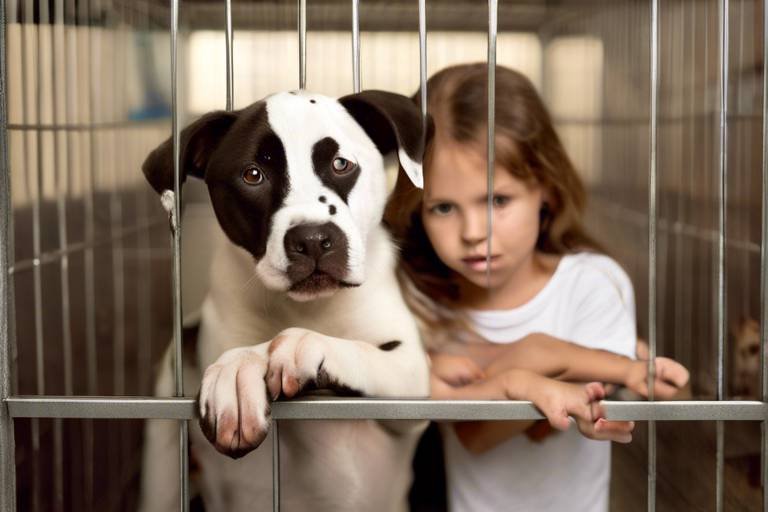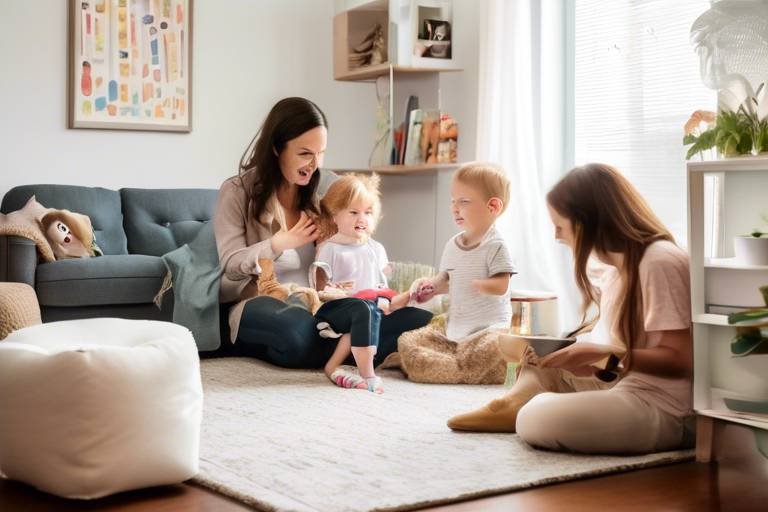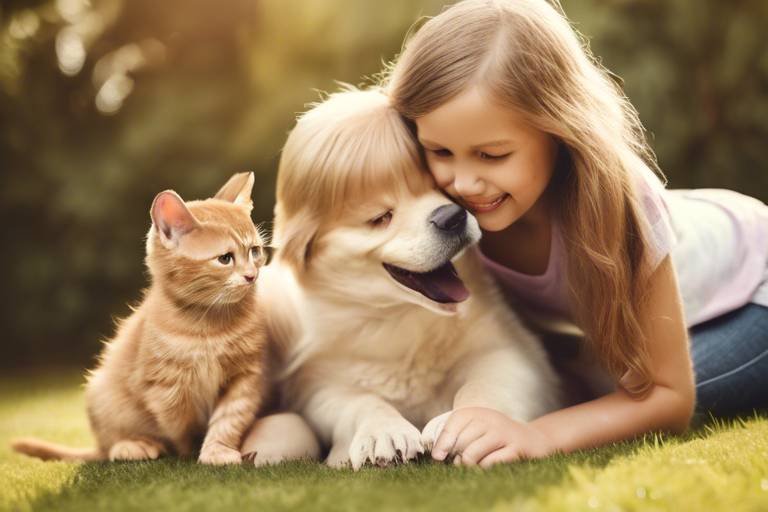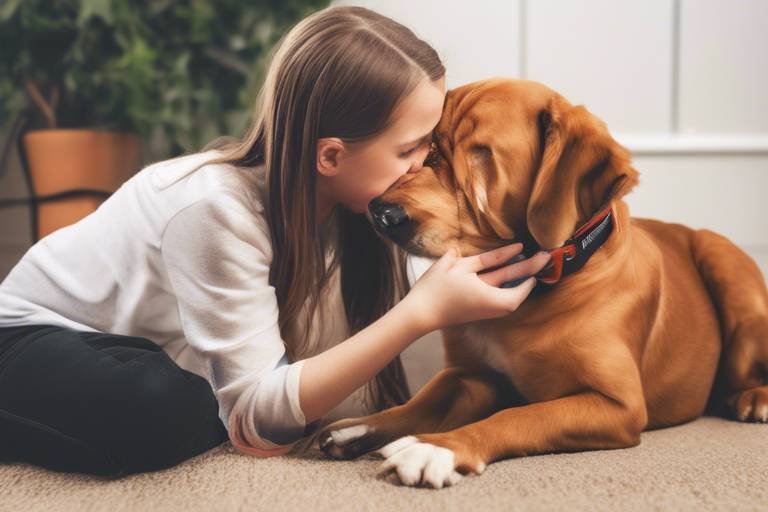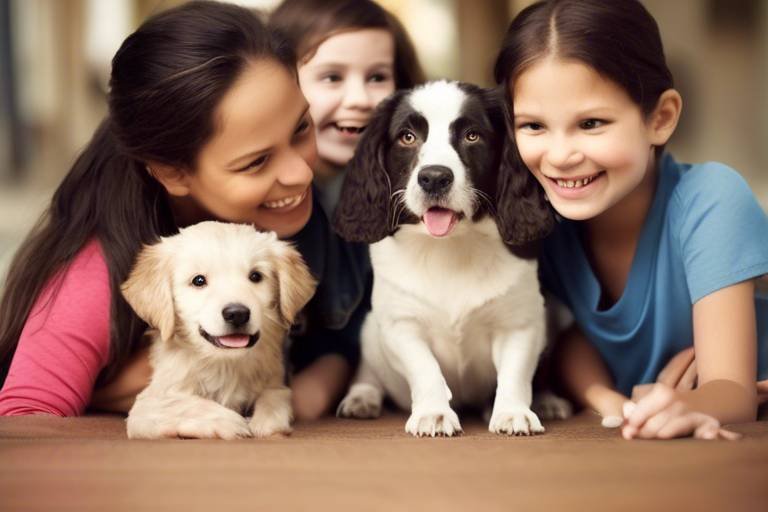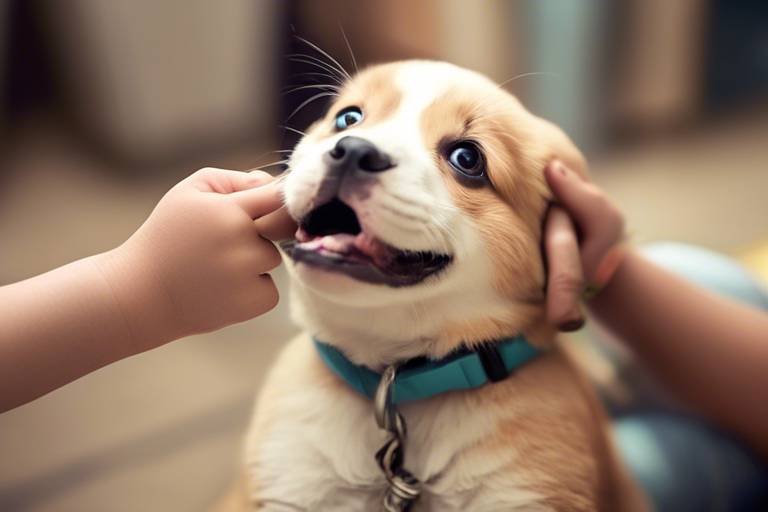The Emotional Rewards of Adopting a Rescue Pet
Adopting a rescue pet is not just about giving an animal a home; it's about opening your heart to a world of unconditional love and companionship. The emotional rewards of welcoming a furry friend into your life can be profound and transformative. Imagine coming home after a long day, and there, waiting for you with wagging tails or gentle purrs, is a creature that loves you without judgment. This bond can bring joy, heal emotional wounds, and create a sense of belonging that many of us crave. In this article, we will explore the various ways adopting a rescue pet can enrich your emotional landscape, offering insights into how these animals can become an integral part of our lives.
When we talk about the bond between humans and pets, we're discussing something that goes beyond mere companionship. This connection is often described as a deep emotional tie that can enhance our overall well-being. Pets have an incredible way of sensing our emotions; they can tell when we’re happy, sad, or stressed. This unique relationship provides a source of unconditional love that is incredibly fulfilling. The joy of pet ownership is not just about having a cute face to come home to; it’s about sharing your life with a creature that offers loyalty and affection in return. Studies have shown that pet owners often report feeling less lonely and more connected to the world around them, which is a testament to the power of this bond.
Adopting a rescue pet can be a game-changer for your mental health. Pets have a magical way of helping us combat feelings of anxiety, depression, and loneliness. The simple act of petting a dog or cat can release endorphins—the feel-good hormones—into our systems. This natural boost can help lift our spirits and improve our overall mood. Moreover, the responsibility of caring for a pet can give us a sense of purpose, helping to distract us from our worries and providing a routine that can be grounding in times of turmoil.
Establishing a daily routine with a pet can provide much-needed structure and stability, especially for those grappling with stress or mental health challenges. Whether it’s morning walks, feeding times, or play sessions, these rituals can create a comforting rhythm in our lives. Just as a lighthouse guides ships safely to shore, a pet's routine can help guide us through the stormy seas of our emotions.
Engaging in pet care routines—like grooming, feeding, and training—can serve as a form of therapy. These activities promote mindfulness, allowing us to focus on the present moment and reduce stress levels. For many, spending time with their pets becomes a meditative experience, where worries fade away, and joy takes center stage. It’s like having a personal therapist who doesn’t charge a fee!
Playtime with pets is not just fun; it’s essential for both their well-being and ours. Engaging in playful interactions can release endorphins and create a sense of happiness. Whether it’s throwing a ball for a dog or playing with a feather toy for a cat, these moments of joy can significantly reduce feelings of sadness or anxiety. It’s a win-win situation—while we bring joy to our pets, they, in turn, bring joy to us!
Having a rescue pet provides a sense of companionship that can alleviate feelings of isolation. During tough times, a pet can offer emotional support that feels genuine and unwavering. Their presence can make our homes feel warmer and our lives feel richer. It’s like having a constant friend who’s always there to listen, even if they don’t speak a word.
One of the most beautiful gifts a rescue pet offers is the experience of unconditional love and acceptance. For individuals struggling with self-esteem or feelings of worthlessness, this love can be incredibly healing. Pets don’t care about our flaws; they love us for who we are. This acceptance can help foster a sense of self-worth and emotional resilience, reminding us that we are deserving of love and happiness.
Caring for a rescue pet fosters empathy and responsibility, especially in children. It teaches valuable life lessons about compassion, commitment, and the importance of caring for another living being. These lessons can shape character and instill values that last a lifetime. It’s like planting seeds of kindness that grow and flourish as children mature.
Adopting a rescue pet can positively influence family dynamics. It brings family members closer together through shared responsibilities and experiences. Whether it’s walking the dog, feeding the cat, or simply enjoying quiet moments together, these activities enhance emotional bonds. Families that adopt pets often find themselves creating lasting memories and deepening their connections, much like a tapestry woven with love and care.
- Q: How does having a pet improve mental health?
A: Pets provide companionship, reduce feelings of loneliness, and encourage physical activity, all of which contribute to better mental health. - Q: What are the responsibilities involved in pet ownership?
A: Responsibilities include feeding, grooming, exercising, and providing medical care for your pet. - Q: Can children benefit from having a pet?
A: Yes, children can learn empathy, responsibility, and the importance of caring for another living being through pet ownership.

The Bond Between Humans and Pets
The bond between humans and pets is a remarkable connection that transcends words. It’s like having a silent conversation with a friend who understands every emotion you go through. Imagine coming home after a long day, feeling drained and overwhelmed. The moment you walk through the door, your furry companion greets you with wagging tails or gentle purrs, instantly lifting your spirits. This unique relationship is not just about companionship; it’s about unconditional love and emotional support that can profoundly enhance our well-being.
Research has shown that the presence of pets can lead to significant improvements in mental health. When we interact with our pets, our brains release oxytocin, often referred to as the "love hormone." This chemical plays a crucial role in forming emotional bonds and can help reduce stress and anxiety levels. Just think about it: when you cuddle with your pet, you’re not just providing affection; you’re also engaging in a mutual exchange of love and comfort that can make the world feel a little less daunting.
Moreover, the responsibilities that come with pet ownership create a sense of purpose. Feeding, walking, and caring for a pet instill a routine that can be incredibly grounding. For many, these daily tasks become a cherished part of life, fostering a sense of belonging and routine. This is particularly beneficial for individuals who may be struggling with feelings of loneliness or isolation. Having a pet by your side can transform a mundane day into an adventure filled with joy and laughter.
Pets also serve as a mirror, reflecting our emotions and helping us understand ourselves better. When we see our pets happy, it sparks joy within us; conversely, when they are anxious or stressed, it can prompt us to reflect on our own feelings. This emotional reciprocity deepens the bond we share, creating a relationship built on empathy and understanding. It’s not just about taking care of a pet; it’s about nurturing a connection that enriches our lives.
In essence, the bond between humans and pets is a beautiful tapestry woven with threads of love, joy, and companionship. It’s a relationship that teaches us invaluable lessons about empathy, responsibility, and the power of unconditional love. So, the next time you look into your pet's eyes, remember that you’re not just looking at an animal; you’re gazing into a soul that has the power to transform your life in ways you never imagined.
- How can pets improve my mental health? Pets provide companionship, reduce feelings of loneliness, and encourage physical activity, all of which contribute to better mental health.
- What types of pets are best for emotional support? While dogs and cats are the most common, many people find comfort in smaller pets like rabbits or even fish, depending on their lifestyle.
- Can children benefit from having a pet? Absolutely! Pets teach children empathy, responsibility, and can enhance their emotional development.
- How do I know if I’m ready to adopt a rescue pet? Consider your lifestyle, financial stability, and commitment level. It’s essential to ensure you can provide a loving home.
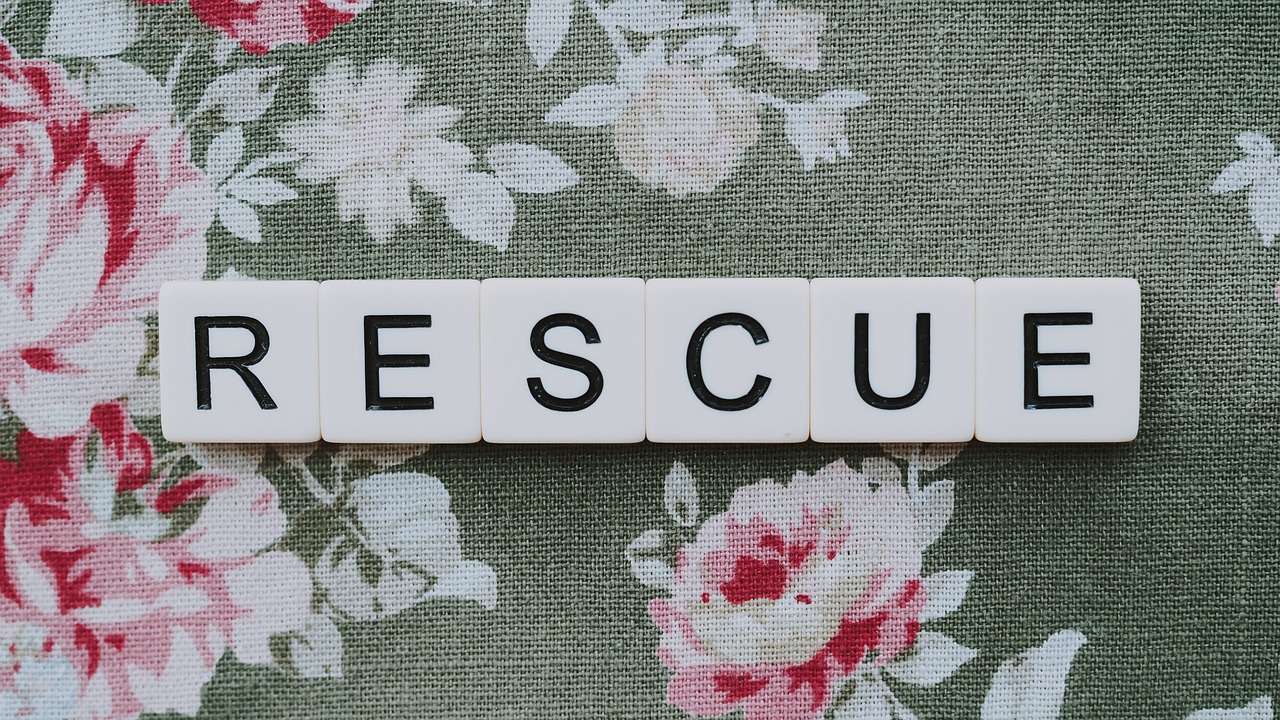
Adopting a rescue pet can be a **transformative experience** for many individuals, especially when it comes to improving mental health. The companionship that a furry friend provides can help alleviate feelings of **anxiety**, **depression**, and **loneliness**. Imagine coming home after a long day, feeling the weight of the world on your shoulders, only to be greeted by a wagging tail or a gentle purr. This simple act can instantly lift your spirits, reminding you that you are not alone.
Studies have shown that the presence of pets can lead to a significant reduction in stress levels. When you stroke a pet's fur or hear their soothing sounds, your body releases **oxytocin**, often referred to as the "love hormone." This chemical reaction fosters feelings of happiness and connection, almost like a warm hug from a friend. Moreover, the responsibility of caring for a pet can instill a sense of purpose, which is particularly beneficial for those struggling with mental health issues.
Establishing a routine with your rescue pet can also provide much-needed structure in your life. For instance, taking your dog for a walk every morning or setting aside time to play with your cat can create a sense of normalcy and predictability. This routine not only benefits your pet but also serves as a **foundation for your own emotional health**. It’s like having a built-in schedule that encourages you to get out of bed and engage with the world, even on days when motivation is hard to find.
Having a consistent daily routine is essential for anyone dealing with stress or mental health challenges. When you adopt a rescue pet, you naturally incorporate them into your life, creating a schedule that revolves around their needs. This routine can include:
- Feeding times
- Regular walks
- Play sessions
- Grooming activities
Each of these activities not only benefits your pet but also serves as a grounding practice for you. Knowing that you have responsibilities can help you stay focused and engaged, reducing feelings of aimlessness that often accompany mental health struggles.
Engaging in pet care routines can be incredibly therapeutic. Whether it’s grooming your dog, cleaning the litter box, or simply feeding your cat, these activities promote **mindfulness**. When you focus on the task at hand, you can momentarily set aside your worries and immerse yourself in the present moment. This form of therapy encourages you to be aware of your feelings and surroundings, which can be a powerful tool in managing mental health.
Let’s not forget the sheer joy that comes from playtime! Tossing a ball for your dog or dangling a string for your cat can transform your mood in an instant. Playtime is not just about fun; it releases **endorphins**, the body's natural feel-good chemicals. These little bursts of happiness can help combat feelings of sadness or anxiety, making play an essential part of both your and your pet’s routine.
In conclusion, adopting a rescue pet can significantly improve mental health by providing companionship, instilling a sense of responsibility, and encouraging a structured routine. The emotional rewards are immense, offering a path to healing and joy that many people desperately need.
Q: How do pets help with anxiety?
A: Pets provide companionship, which can ease feelings of anxiety. Their presence can create a calming environment and help divert attention from stressors.
Q: Can having a pet really reduce depression?
A: Yes, pets can offer unconditional love and support, which can be incredibly uplifting for individuals dealing with depression.
Q: What kind of pet is best for mental health?
A: While dogs and cats are popular choices, the best pet for mental health varies by individual. It’s important to consider your lifestyle and preferences.
Q: Do I need to have experience to adopt a rescue pet?
A: No, many rescue organizations provide resources and support for first-time pet owners, making it easier to transition into pet ownership.
Establishing a daily routine with a rescue pet can be a game-changer, not just for the pet but for the owner as well. Think about it: when you wake up each day, your furry friend is there, eagerly waiting for breakfast, a walk, or just some quality cuddle time. This simple act of caring for another being instills a sense of purpose and structure in your day. For many, especially those grappling with emotional challenges, this routine can serve as an anchor in the stormy seas of life.
Imagine the joy of knowing that at 8 AM, you’re going to take your dog for a walk, or at 6 PM, it’s time for the cat’s dinner. These small yet significant moments create a rhythm in your life, making it easier to manage stress and anxiety. The predictability of these routines can provide a comforting sense of stability, especially for individuals who might feel overwhelmed by their daily challenges.
Moreover, routines can help in promoting a sense of responsibility. When you adopt a rescue pet, you’re not just bringing home a companion; you’re also committing to their care. This responsibility can be incredibly fulfilling, as it encourages you to stay active and engaged. Here’s how a daily routine can benefit both you and your pet:
- Consistency: Pets thrive on consistency. Knowing when they will be fed, walked, or played with helps them feel secure and loved.
- Structure: A routine provides a framework for your day, allowing you to manage your time more effectively.
- Emotional Stability: Engaging in regular activities with your pet can promote emotional stability, reducing feelings of anxiety and depression.
- Bonding Time: Routine activities, such as feeding and walking, strengthen the bond between you and your pet, fostering a deeper connection.
In essence, the role of routine in the lives of pet owners is profound. It’s like having a built-in support system that not only helps your pet but also enhances your emotional well-being. By committing to a daily routine, you’re not just giving your rescue pet a loving home; you’re also creating a nurturing environment for yourself. So, the next time you find yourself feeling a bit lost, remember that your furry friend is there to guide you, one paw at a time.
Q: How can a routine help my mental health?
A: A routine can provide structure and predictability, which can significantly reduce feelings of anxiety and depression. It encourages engagement and responsibility, both of which are beneficial for mental well-being.
Q: What types of routines should I establish with my rescue pet?
A: You can create routines around feeding, walking, grooming, and playtime. Consistency in these activities helps your pet feel secure and strengthens your bond.
Q: Can routines really make a difference in my relationship with my pet?
A: Absolutely! Regular routines enhance trust and companionship, making your relationship with your pet more fulfilling and enjoyable.
Engaging in pet care routines is not just about feeding and grooming; it’s a therapeutic activity that can significantly enhance our mental well-being. Think about it: when you brush your dog’s fur or prepare their meals, you’re not just performing a chore. You’re creating a moment of mindfulness that pulls you into the present. This act of caring becomes a ritual, a soothing balm for the chaos of daily life. It’s like meditation, but with a wagging tail or a gentle purr by your side.
Moreover, the responsibilities that come with pet care can provide a much-needed distraction from our worries. When you focus on your pet's needs, you momentarily set aside your own troubles. This shift in focus can be incredibly liberating. For many, the simple act of caring for a pet can reduce feelings of anxiety and promote a sense of calm. It’s as if your furry friend becomes a little therapist, offering comfort just by being there.
Consider the routine of walking your dog. Not only does it provide necessary exercise, but it also gives you a chance to breathe in the fresh air, observe the world around you, and connect with nature. Each step you take can feel like a step away from stress. And let’s not forget the joy that comes from seeing your pet's excitement as you grab the leash—it's a reminder of the simple pleasures in life.
Here are some ways pet care can act as a therapeutic activity:
- Mindfulness Practice: Focusing on your pet's needs can help you practice mindfulness, reducing stress and anxiety.
- Physical Activity: Regular walks and playtime encourage physical movement, which is beneficial for both you and your pet.
- Emotional Release: Caring for a pet can provide an emotional outlet, allowing you to express feelings of love and affection.
In essence, pet care transforms mundane tasks into a nurturing experience. It’s a reminder that we are capable of giving and receiving love, which is fundamental to our emotional health. So the next time you find yourself grooming your cat or preparing dinner for your dog, take a moment to appreciate how these small acts contribute to your overall well-being. They are not just chores; they are steps towards a healthier, happier you.
Q: How does pet care improve mental health?
A: Pet care routines promote mindfulness, provide companionship, and distract from stressors, all of which can enhance mental well-being.
Q: Can pet care be considered a form of therapy?
A: Yes, engaging in pet care can serve as a therapeutic activity, helping to reduce anxiety and depression while fostering a sense of purpose.
Q: What are some simple pet care activities that can be therapeutic?
A: Activities such as grooming, feeding, walking, and playing with your pet can all provide therapeutic benefits.
Q: Do pets sense their owner's emotions?
A: Yes, pets are incredibly intuitive and can often sense their owner’s emotions, providing comfort and companionship during tough times.
Playtime with your rescue pet is not just a way to pass the time; it’s a magical experience that can transform your day in ways you might not even expect. Imagine coming home after a long, tiring day, and the moment you walk through the door, your furry friend is there, tail wagging and eyes sparkling with excitement. That moment alone can lift your spirits! Engaging in play fosters a unique bond between you and your pet, creating a shared language that deepens your connection.
But it’s not just about the joy of seeing your pet happy; playtime is also a crucial component for both mental and physical health. When you toss a ball or dangle a string for your cat, you’re not just entertaining them; you’re also releasing endorphins in yourself. These feel-good hormones can significantly reduce feelings of sadness or anxiety, making playtime a win-win situation. It’s like a natural therapy session, where laughter and joy are the main ingredients!
Moreover, the benefits of play extend beyond just the immediate joy. Regular playtime can help keep your pet physically fit, which in turn contributes to their overall happiness and longevity. A well-exercised pet is often a well-behaved pet, as they have outlets for their energy and stress. This can lead to a calmer household, where both you and your pet can relax and enjoy each other's company.
To enhance your playtime experience, consider varying the types of activities you do together. Here are a few ideas:
- Fetch: A classic game that can be played with dogs, it stimulates their natural instincts while providing a great workout.
- Interactive Toys: Puzzle toys for dogs or feather wands for cats can keep their minds sharp and engaged.
- Agility Training: Setting up a mini obstacle course in your backyard can provide both exercise and mental stimulation.
In the end, playtime is not just an activity; it’s a celebration of life, love, and companionship. It’s a reminder that amidst our busy lives, taking a moment to engage in play can provide profound emotional rewards. So, grab that ball, pull out the laser pointer, or just roll around on the floor with your pet. You’ll find that these moments are not just joyful; they are essential to your emotional well-being and the happiness of your furry friend.
Q: How often should I play with my rescue pet?
A: Ideally, you should engage in playtime with your pet at least once a day, but the frequency can vary based on your pet's energy levels and needs.
Q: What are some safe toys for my rescue pet?
A: Look for toys that are specifically designed for your pet's size and breed. Avoid small items that can be swallowed and ensure that any fabric toys are durable and non-toxic.
Q: Can playtime help with behavioral issues?
A: Yes! Regular playtime can help alleviate boredom and excess energy, which are often the root causes of behavioral problems in pets.
When you bring a rescue pet into your home, you’re not just adopting an animal; you’re inviting a new companion into your life. This companionship can be a profound source of comfort, especially during tough times. Imagine coming home after a long day, feeling the weight of the world on your shoulders, and then being greeted by a wagging tail or a gentle purr. It’s like a warm hug that wraps around your heart, reminding you that you are never truly alone. This bond creates a safe space where you can express your feelings without judgment, fostering a sense of belonging that many of us crave.
The presence of a pet can significantly reduce feelings of loneliness and isolation. Studies have shown that simply petting a dog or cat can release oxytocin, often referred to as the “love hormone,” which helps to build trust and emotional connection. This chemical reaction not only boosts your mood but also strengthens the bond you share with your furry friend. They become your confidants, your cheerleaders, and sometimes even your therapists, listening to your worries without interruption.
Moreover, the companionship of a rescue pet encourages you to engage with the world around you. Whether it's taking your dog for a walk in the park or playing with your cat, these activities foster social interactions. You may find yourself chatting with fellow pet owners, sharing experiences, or even forming new friendships. This ripple effect of connection can be incredibly beneficial for your mental health, as it creates a sense of community and support.
Additionally, having a pet can instill a sense of purpose in your life. Knowing that you are responsible for another being's well-being can be a powerful motivator. It gives you a reason to get out of bed, to establish a routine, and to take care of yourself as well. This mutual care creates a beautiful cycle of love and support. You feed them, groom them, and spend quality time together, and in return, they provide you with unwavering loyalty and affection.
In essence, the comfort of companionship that comes from adopting a rescue pet is a gift that keeps giving. It’s not just about having a pet; it’s about enriching your life with love, joy, and a sense of belonging. As you nurture this relationship, you’ll likely find that your emotional well-being flourishes, and the bond you create with your rescue pet becomes one of the most rewarding experiences of your life.
- What are the benefits of adopting a rescue pet?
Adopting a rescue pet provides emotional support, companionship, and a sense of purpose. It can also improve mental health by reducing feelings of loneliness and anxiety. - How does having a pet improve mental health?
The presence of a pet can reduce stress, increase feelings of happiness, and promote a sense of routine, all of which contribute to better mental health. - Can pets help with feelings of isolation?
Yes! Pets provide companionship and encourage social interactions, helping to alleviate feelings of isolation. - What responsibilities come with pet ownership?
Pet ownership includes feeding, grooming, exercising, and providing medical care, which can instill a sense of responsibility and routine.

When you adopt a rescue pet, you are not just bringing home an animal; you are inviting a bundle of unconditional love and acceptance into your life. These furry companions have a unique ability to sense our emotions and respond in ways that can be incredibly healing. Imagine coming home after a long, tough day. The moment you step through the door, your rescue pet greets you with wagging tails or soft purrs, as if to say, "I'm here for you!" This simple act of affection can lift your spirits and remind you that you are not alone.
For many individuals, especially those dealing with feelings of low self-esteem or worthlessness, the love from a rescue pet can serve as a powerful reminder of their value. These animals don't care about your past mistakes or your current struggles; they love you just as you are. This kind of acceptance can be profoundly therapeutic. It's like having a constant source of encouragement that whispers, "You are enough." In a world that often feels critical and judgmental, the presence of a loving pet can be a breath of fresh air.
Moreover, the bond you form with a rescue pet can help you rediscover your own capacity for love. As you care for them, you develop a deeper understanding of empathy and compassion. You start to recognize their needs, and in turn, you learn to be more attuned to your own feelings. This symbiotic relationship can lead to an emotional transformation, where both you and your pet grow together. It’s a beautiful dance of love and acceptance that enhances your emotional well-being.
In addition, the healing power of a pet's presence is often supported by various studies. Research shows that interacting with pets can lead to lower levels of stress and anxiety. Just petting your dog or cat can trigger the release of oxytocin, often referred to as the "love hormone." This hormone not only enhances your mood but also strengthens the bond you share with your pet. It’s a win-win situation!
Let’s not forget that adopting a rescue pet also means giving them a second chance at life. Many of these animals have faced abandonment or abuse, and by welcoming them into your home, you are providing them with a safe haven. This act of kindness fosters a deep sense of gratitude and loyalty in your pet, further enriching the bond you share. Knowing that you have made a positive impact on another being’s life can be incredibly fulfilling and can boost your own sense of purpose.
In conclusion, the unconditional love and acceptance offered by rescue pets create a nurturing environment that promotes emotional healing and growth. Whether you are looking for companionship, a sense of purpose, or simply a friend to share your life with, a rescue pet is sure to provide all that and more. They remind us that love comes in many forms, and sometimes, it’s the simplest gestures that have the most profound effects on our hearts.
- What are some benefits of adopting a rescue pet? Adopting a rescue pet can provide emotional support, reduce feelings of loneliness, and enhance your overall mental health.
- How do pets help with mental health? Pets can reduce stress, anxiety, and depression through companionship and the joy they bring into our lives.
- Can children benefit from having a rescue pet? Absolutely! Caring for a pet can teach children about empathy, responsibility, and the importance of compassion.
- What should I consider before adopting a rescue pet? Consider your lifestyle, the time you can dedicate to a pet, and the type of pet that would best fit your home environment.
Adopting a rescue pet is not just about bringing home a furry friend; it’s a powerful lesson in empathy and responsibility. When children and even adults take on the role of a pet owner, they are thrust into a world where their actions directly affect another living being. This relationship cultivates a sense of empathy as they begin to understand the needs and emotions of their pets. For instance, when a child sees their dog looking sad or anxious, they learn to respond with care and compassion, recognizing that their pet has feelings just like they do.
Moreover, the responsibility that comes with pet ownership is significant. From feeding and grooming to walking and vet visits, every task contributes to the well-being of the pet and teaches valuable life skills. Children who engage in these activities develop a sense of accountability that extends beyond their pets. They learn that their actions have consequences, which is a fundamental lesson in growing up. It’s like planting a seed of responsibility that can blossom into a mature understanding of commitment and care for others.
Let’s take a closer look at some key aspects of how adopting a rescue pet fosters these essential qualities:
- Understanding Needs: Pets require regular feeding, exercise, and medical care. By taking charge of these responsibilities, individuals learn to prioritize the needs of others over their own whims.
- Building Trust: As pets become accustomed to their owners, a bond of trust forms. This teaches the importance of reliability and consistency, essential components of any relationship.
- Experiencing Loss: Caring for a pet also prepares individuals for the inevitability of loss. Whether it's dealing with a pet's illness or passing, these experiences can deepen emotional resilience and understanding.
In essence, adopting a rescue pet is a journey that enriches lives. It’s a process of learning that goes beyond mere companionship; it’s about nurturing a connection that builds character and promotes emotional growth. The lessons learned through this relationship can shape individuals into more empathetic and responsible members of society, ready to face the world with a compassionate heart.
Q: How can adopting a rescue pet help my child develop empathy?
A: When children care for a rescue pet, they learn to recognize and respond to the feelings of their pet, fostering a deeper understanding of empathy.
Q: What responsibilities do children have when caring for a pet?
A: Responsibilities can include feeding, grooming, walking, and ensuring the pet has regular veterinary check-ups, which teaches accountability.
Q: Are there any emotional benefits for adults adopting a rescue pet?
A: Absolutely! Adults can experience reduced stress, increased happiness, and a sense of companionship, which can greatly enhance their emotional well-being.
Q: How does pet ownership impact family dynamics?
A: Adopting a rescue pet can bring family members closer together as they share responsibilities and create memories, ultimately strengthening emotional bonds.
Adopting a rescue pet can be a transformative experience for families, acting as a catalyst that strengthens bonds and fosters a sense of unity. When a family decides to welcome a furry friend into their home, they embark on a shared journey filled with responsibilities, challenges, and joys. This collective experience can create a deeper connection among family members, as they work together to care for their new pet. Imagine the laughter and teamwork involved in training a puppy or the cozy evenings spent cuddled up with a cat on the couch—these moments become cherished memories that bring families closer.
Moreover, the presence of a pet can serve as a natural icebreaker, especially in families where communication may be lacking. Pets have a unique ability to draw people together, sparking conversations and shared activities. For instance, children may find themselves more inclined to engage with their parents when discussing their pet’s antics or when participating in playtime. This not only enhances the emotional atmosphere at home but also encourages a culture of open communication and teamwork.
The responsibilities associated with pet ownership can also teach valuable lessons about commitment and teamwork. Family members often have to divide tasks such as feeding, walking, and grooming. This division of labor not only instills a sense of responsibility but also promotes cooperation. For example, a weekly schedule can be created to ensure that everyone participates in caring for the pet, fostering a sense of accountability and shared purpose. Here’s a simple example of how such a schedule might look:
| Day | Task | Assigned Family Member |
|---|---|---|
| Monday | Feeding | Mom |
| Tuesday | Walking | Dad |
| Wednesday | Grooming | Child 1 |
| Thursday | Feeding | Child 2 |
| Friday | Walking | Mom |
| Saturday | Grooming | Dad |
| Sunday | Family Playtime | All |
In addition to teaching responsibility, having a rescue pet can enhance the emotional dynamics within a family. Pets often provide a sense of comfort and companionship, especially during challenging times. They can be a source of unconditional love and support, which is particularly beneficial for children navigating the complexities of growing up. The act of caring for a pet can also instill empathy in children, teaching them to understand and respond to the needs of others. This emotional intelligence is a valuable skill that extends beyond the family unit and into their interactions with peers and society.
Furthermore, families with pets often report higher levels of happiness and lower levels of stress. The simple act of petting a dog or playing with a cat can release endorphins, fostering a positive atmosphere at home. When family members engage in playful activities with their pets, it creates a joyful environment that can help alleviate tensions and promote a sense of togetherness. In essence, a rescue pet can become a beloved family member, enriching lives and reinforcing the bonds that hold the family together.
- How does having a pet improve family relationships?
Pets encourage teamwork, communication, and shared responsibilities, which can strengthen family bonds. - What are the benefits of adopting a rescue pet specifically?
Rescue pets often come with a unique backstory and can teach compassion and empathy, making them especially rewarding companions. - Can pets help children with social skills?
Yes, pets can serve as social facilitators, helping children learn to communicate and interact positively with others.
Frequently Asked Questions
- What are the emotional benefits of adopting a rescue pet?
Adopting a rescue pet can bring immense joy and companionship into your life. These animals often provide unconditional love, which can significantly enhance your emotional well-being. The bond you form with your pet can help reduce feelings of loneliness and anxiety, making every day a little brighter.
- How can a rescue pet improve my mental health?
Having a rescue pet can act as a natural mood booster. The responsibility of caring for a pet encourages routine and structure in your life, which is crucial for mental health. Additionally, spending time with pets can release endorphins, helping to alleviate symptoms of depression and anxiety.
- Can adopting a pet help with feelings of isolation?
Absolutely! A rescue pet offers companionship that can be incredibly comforting during tough times. They can help you feel less alone and provide emotional support, fostering a sense of belonging and connection.
- What role does routine play in pet ownership?
Establishing a daily routine with your pet creates a sense of stability and predictability in your life. This structure can be especially beneficial for those dealing with stress or mental health challenges, as it encourages responsibility and can help you focus on the present moment.
- How does pet care serve as a therapeutic activity?
Engaging in pet care activities like grooming, feeding, and walking can be therapeutic. These tasks promote mindfulness and help reduce stress, allowing you to connect with your pet while also taking care of your own mental health.
- What are the benefits of playtime with my pet?
Playtime is not just fun; it strengthens the bond between you and your pet. It releases endorphins, which can elevate your mood and help combat feelings of sadness or anxiety. Plus, it's a great way to let loose and enjoy some quality time together!
- How does having a rescue pet teach empathy and responsibility?
Caring for a rescue pet teaches valuable life lessons about compassion and commitment. It fosters empathy, especially in children, as they learn to understand the needs and feelings of another living being.
- Can adopting a pet change family dynamics?
Yes! Bringing a rescue pet into your home can enhance family dynamics by encouraging shared responsibilities and creating opportunities for bonding. It can bring family members closer together and create lasting memories.




